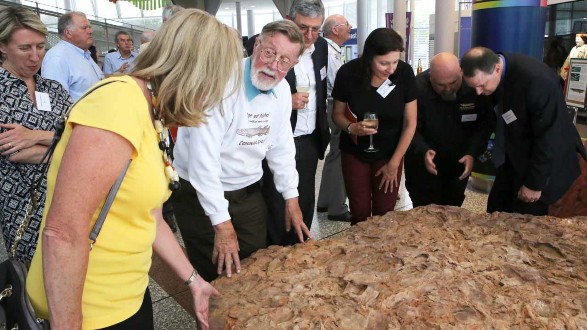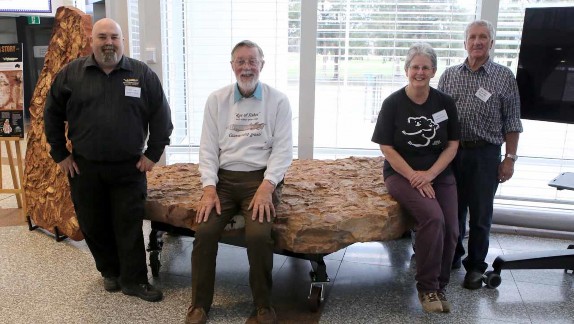
Authors: Mike Smith, NRG Director, and Brad Pillans, Chair of the NRG Steering Committee
Extract from National Rock Garden Newsletter No. 10, January 2015
During the launch of the NRG Masterplan (see article above) Dr Alex Ritchie, former Curator of Fossils and now Senior Fellow at the Australian Museum in Sydney, described the history of the 1955 discovery of the spectacular Devonian age fossil site and explained the characteristics of the fish species preserved in the spectacular rock slabs which have been recovered and stored under the management of the Age of Fishes Museum in Canowindra. One of these slabs (number 4) has been donated to the NRG and will be displayed at Questacon from early 2015 until the NRG is able to receive the rock slab for permanent display.

For the keen palaeontologists reading this newsletter, the fossil remains are dominated by two kinds of strange armoured fishes belonging to a long extinct group of Placoderms. Bothriolepis and Remigolepis had paired fins which were encased in bony plates and hinged to the trunk armour. Parts of two specimens are from another armoured fish, Groenlandaspis. In total, the Canowindra site hosts at least eight species. The largest are the air-breathing lobe-finned sarcopterygians, a group that included the ancestors of the first vertebrates to invade dry land, the tetrapod amphibians.

Note: Much to the concern of other launch attendees, the staff were sitting on Fish Slab#4, but we were re-assured sitting on the slab is harmless. In the background behind Warren you can see a cast of another fossil slab.
The Masterplan launch also featured a video clip of Sir David Attenborough enthusiastically discussing the significance of the Canowindra fossils with Dr Ritchie.
Mr Warren Keedle and Mr Bruce Loomes, from the Age of Fishes Museum, officially unveiled the fossil fish slab at the launch.
For additional information about the Age of Fishes Museum in Canowindra, please visit www.ageoffishes.org.au.


